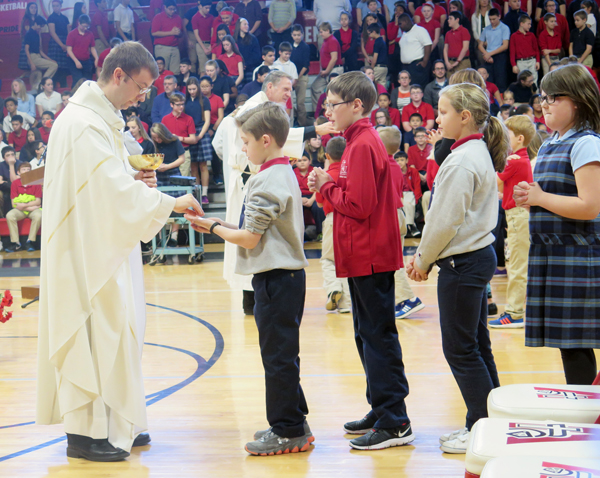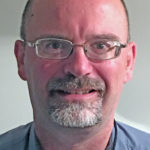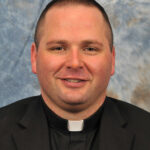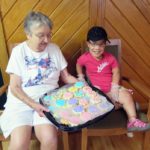By Barb Arland-Fye
The Catholic Messenger
Catholic school leaders in the Davenport Diocese and around the United States are committed to moving forward in reaching out to families of students with disabilities. “It is important for schools to let families know that Catholic schools can be a possibility,” observe the authors of “Exceptional Learners White Paper: One Spirit, One Body.” “Without a welcoming response to families, Catholic schools run the risk of “closing the doors’’ — not just of the schools but of the Church, as well.”

Father Thom Hennen, director of vocations for the Diocese of Davenport, distributes Communion to Scott County Catholic school students during Catholic Schools Week earlier this year. Diocesan schools are working to accommodate more students with varying abilities.
Earlier this summer, the National Catholic Education Association conducted a three-day conference in Evanston, Ill., that explored solutions and ideas to support students with disabilities, gifted and talented students, and English language learners. Lee Morrison, superintendent of schools for the Davenport Diocese, and Anna Schott, a school counselor at JFK Catholic School in Davenport, attended the New Directions Exceptional Learners Conference.
“The conference was an excellent opportunity to learn how to effectively facilitate the design and delivery of a truly inclusionary model of meeting the needs of exceptional learners,” Morrison said. “It was a very uplifting conference as speaker after speaker reminded us of our unified mission to serve all of God’s children.”
“I truly believe that Catholic schools are the best learning environment for all students,” Schott said. “Our faith is the anchor of our communities and who is more deserving of being immersed in a Christ-centered education than those children with the greatest needs? Jesus calls us to tend to the marginalized and struggling. Not only do the students with exceptional needs benefit when they have a place in our community, all members of our community benefit,” she said. “I want to be a part of opening doors to all learners in Catholic education. It is my dream that our Catholic schools continue to grow in a way where all are welcome to the table.”
During the conference, Archbishop Joseph Kurtz of the Archdiocese of Louisville, Ky., shared the story of living with and learning from his brother George, who was born with Down syndrome. The archbishop “reminded us that by assisting a diversity of learners in our Catholic schools, we foster a culture of empathy amongst our students, families, faculties and staff,” Morrison noted.
Another speaker, Ellen Wedemeyer, author of “No Children of a Lesser God,” shared moving stories about growing up as a child with special needs in a Catholic school. Her watershed moment occurred in the fourth grade, when her teacher, Mrs. Egan, said: “You learn in a way I have never seen before, and I don’t know what we are going to do about it, but we are going to figure it out together.”
The Davenport Diocese’s commitment to accommodate exceptional learners is among the goals in the strategic plan for Catholic schools. The goal calls for “Each school to create learning opportunities to accommodate students of varying academic abilities that include robust enrichment, remedial, and co-curricular programs and expanded resources for preschoolers and students with special learning needs.” If dedicated programs are not feasible, teachers will receive assistance and support in providing differentiated instruction in the classroom, the goal states.
“Our Catholic schools have been going above and beyond what is required by law in providing programs for exceptional learners for a good many years,” Morrison said. “The law does not require a non-public school to provide guidance, special education, at-risk or talented and gifted programming. Many of our schools have used their own funds to hire learning support specialists to assist students who are struggling in the core academic areas. Most of our schools have guidance programs paid for without assistance from state or local sources. The conference provided a unique opportunity to share information and best practices with other Catholic school leaders who face the same challenges without resources.”
Morrison gained insights from sessions on exceptional learners in Catholic high schools; bullying; strategies to work with children who simply don’t fit in; working with students with anxiety; and differentiating for high ability learners, among other topics. Schott said the conference helped her build on her existing thoughts and experiences, particularly in looking for ways to think and teach outside the box. “I am looking forward to learning more about making all lessons accessible to a wide range of students and all their unique needs,” she said. She also appreciated being able to connect with other educators who are passionate about Catholic education. “It was a powerful experience to learn, collaborate and pray together.”
So, what are some of the practical applications for Catholic schools in the Davenport Diocese? “The goal is to support our teachers in such a way that they may serve the needs of a wider array of students. In so doing, we must assess the greatest challenges we face in our classrooms,” Morrison said. That might mean providing tools to help students with ADHD organize for productive learning or tapping into ideas and strategies for including students on the autism spectrum, for example. The diocese will look to the proposal of Michael Boyle, co-author of the Exceptional Learners White Paper and director of the Andrew M. Greeley Center for Catholic Education.
“His model outlines the professional development for school staff to enhance knowledge, skills and dispositions,” Morrison said. “We educators must understand the catechetical basis for serving students with disabilities as living the mission of Catholic education. We will do all we can … through our own capacity for creative thinking and the ability to be flexible. The love of God is revealed in this time and this place — our Catholic schools.”
Education expert to speak in diocese
Dawn Benaitis, director of professional development for Discovery Communications, will be the keynote presenter at sessions welcoming all Diocese of Davenport teachers to the 2017-18 academic year. She was the closing speaker at the 2017 New Directions Exceptional Learning Conference. She will challenge diocesan teachers to recognize that learning opportunities are limitless when they consider the “why, what and how of learning,” said Diocesan Schools Superintendent Lee Morrison. “She will push us to think outside the box and outside the classroom when it comes to teaching and learning; creating a thriving learning environment that looks beyond simply engaging our students by empowering them.”











